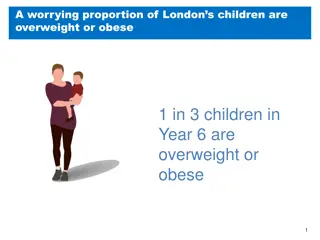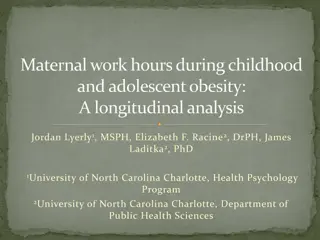Obesity and Its Impact on Health
Obesity is a medical condition characterized by excess body fat accumulation, posing risks to physical, mental, and social well-being. Factors such as genetics, lifestyle, and environment contribute to obesity, leading to health issues like heart disease, diabetes, and mental disorders.
Download Presentation

Please find below an Image/Link to download the presentation.
The content on the website is provided AS IS for your information and personal use only. It may not be sold, licensed, or shared on other websites without obtaining consent from the author.If you encounter any issues during the download, it is possible that the publisher has removed the file from their server.
You are allowed to download the files provided on this website for personal or commercial use, subject to the condition that they are used lawfully. All files are the property of their respective owners.
The content on the website is provided AS IS for your information and personal use only. It may not be sold, licensed, or shared on other websites without obtaining consent from the author.
E N D
Presentation Transcript
Obesity Students : Naya Al- Qamhawi & Nour Saba
What is obesity? Obesity is a medical condition, sometimes considered a disease, in which body fat has accumulated to an extent that it may negatively affect a person's health. Obesity isn't just a cosmetic concern, It's a medical condition that is becoming increasingly common in our world today. A person is classified as obese when their body mass index (BMI) , which is their weight divided by the square of the person's height, is over 30 kg/m2; with the range 25 30 kg/m2 being defined as overweight. (BMI) s are used to indicate body fatness, it screens for weight categories that may lead to health problems, but it does not diagnose the body fatness or health of an individual.
What are the issues caused by obesity ? Obesity has the ability to affect many different aspects of our lives such as our physical health, our financial and social lives. People diagnosed with obesity are at a higher risk of : High blood pressure (hypertension). High LDL cholesterol, low HDL cholesterol, or high levels of triglycerides (dyslipidemia). Type 2 diabetes. Coronary heart disease. Stroke. Gallbladder disease. Sleep apnea and breathing problems. Many types of cancer Mental illness such as clinical depression, anxiety, and other mental disorder. Body pain and difficulty with physical functioning.
Causes of obesity: Some people may assume that obesity is caused by an unhealthy lifestyle/diet, but there are some other factors that play a part in a person's weight as well, such as: Food and Activity People gain weight when they eat more calories than they burn through activity. This imbalance is the greatest contributor to weight gain. Environment Not having area parks, sidewalks, and affordable gyms makes it hard for people to be physically active. Oversized food portions increase Americans calorie intake, making even more physical activity necessary to maintain a healthy weight. Some people don t have access to supermarkets that sell affordable healthy foods, such as fresh fruits and vegetables. Food advertising encourages people to buy unhealthy foods, such as high-fat snacks and sugary drinks.
Genetics Genes may contribute to a person s susceptibility to weight gain. Scientists believe that genes may increase a person s likelihood of having obesity but that outside factors, such as an abundant food supply or little physical activity, also may be required for a person to have excess weight.2 Health Conditions and Medications Some hormone problems may cause overweight and obesity, such as underactive thyroid, Cushing syndrome and polycystic ovary syndrome. Certain medicines also may cause weight gain, including some corticosteroids, antidepressants, and seizure medicines. Stress, Emotional Factors, and Poor Sleep Studies also have found that the less people sleep, the more likely they are to have overweight or obesity. This is partly because hormones that are released during sleep help control appetite and the body s use of energy.
Consequences We talked about the issues obesity has on certain parts of our lives, and there are many consequences stemming from these issues such as : Quality of life: Men and women who carry significant extra weight often face problems related to physical and occupational functioning, both due to their size and chronic ailments. Weight bias and discrimination: One of the biggest challenges for those struggling with weight issues is society s negative perspectives on obesity. Weight bias refers to the stereotypes and attitudes that define people with obesity as unattractive, lazy, and undisciplined. Poor body image: Weight bias and poor body image tend to go hand-in-hand. Patients may internalize society s stigma against obesity, which causes them to feel embarrassed about their weight and dissatisfied with their appearance. People who struggle with excess weight may also experience anxiety over being judged for how they look.
How can you overcome obesity? Choosing healthier foods (whole grains, fruits and vegetables, healthy fats and protein sources) and beverages Limiting unhealthy foods (refined grains and sweets, potatoes, red meat, processed meat) and beverages (sugary drinks) Increasing physical activity Limiting television time, screen time, and other sit time Improving sleep Reducing stress
Conclusion To conclude, what we have learnt is that your weight plays a huge part in your physical and mental health, as long as you keep a healthy diet and regular exercise, you can easily maintain a healthy body & lifestyle.
citations -Mayo Foundation for Medical Education and Research. (2021, September 2). Obesity. Mayo Clinic. Retrieved May 4, 2023, from https://www.mayoclinic.org/diseases-conditions/obesity/symptoms-causes/syc-20375742 - Body Mass Index (BMI). Centers for Disease Control and Prevention, Centers for Disease Control and Prevention, 3 June 2022, https://www.cdc.gov/healthyweight/assessing/bmi/index.html. - Obesity Consequences. Obesity Prevention Source, 12 Apr. 2016, https://www.hsph.harvard.edu/obesity-prevention-source/obesity- consequences/#:~:text=The%20High%20Cost%20of%20Excess%20Weight&text=No%20less%20real%20are%20the,overweight%20does%2 0not%20decrease%20mortality. https://www.ncoa.org/article/how-e. -The National Council on Aging, https://www.ncoa.org/article/how-excess-weight-impacts-our-mental-and-emotional-health/. - What Causes Obesity & Overweight? Eunice Kennedy Shriver National Institute of Child Health and Human Development, U.S. Department of Health and Human Services, https://www.nichd.nih.gov/health/topics/obesity/conditioninfo/cause. - Obesity Prevention Strategies. Obesity Prevention Source, 12 Apr. 2016, https://www.hsph.harvard.edu/obesity-prevention-source/obesity- prevention/#:~:text=Choosing%20healthier%20foods%20.























